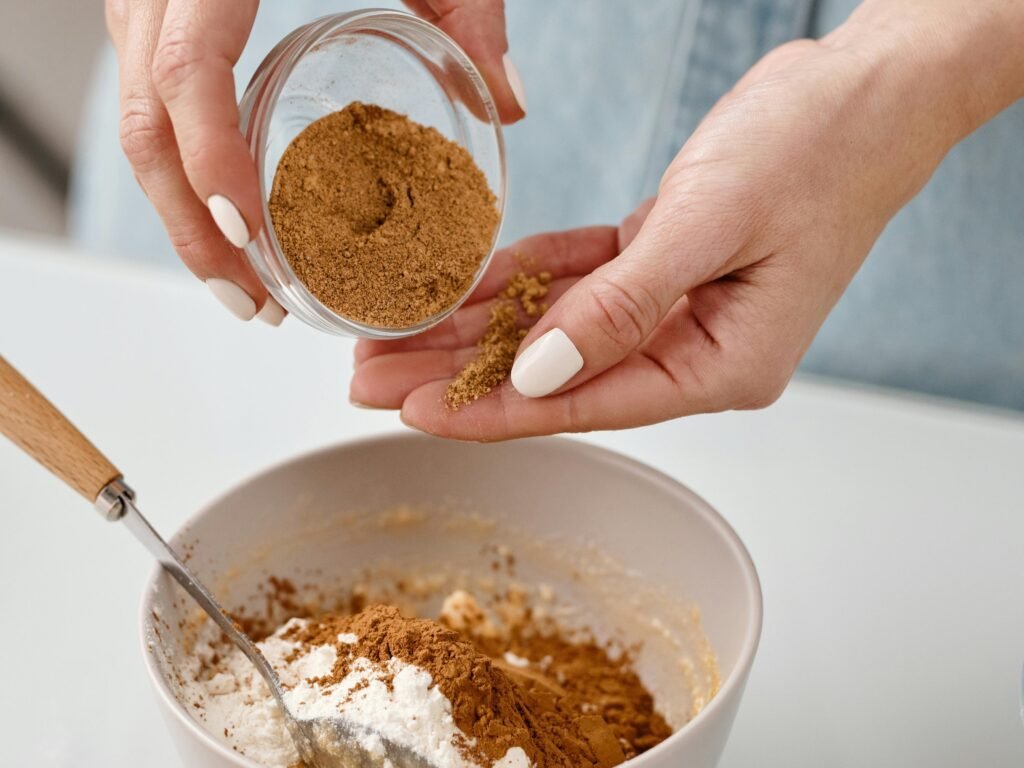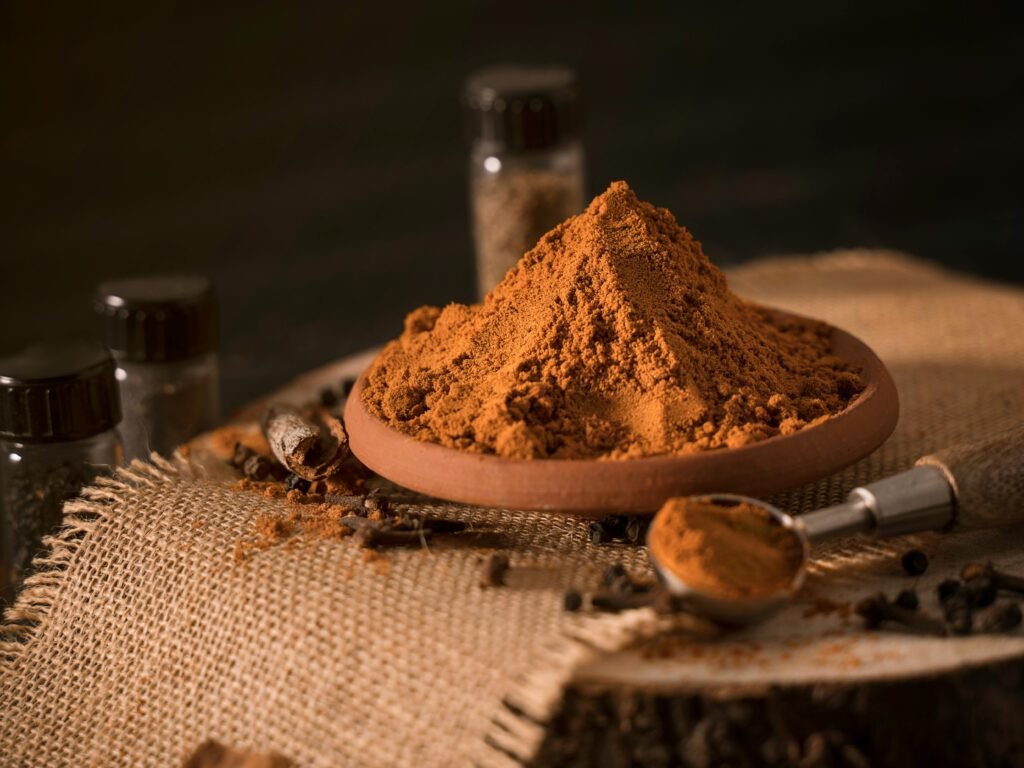Table of Contents
Cinnamon transcends its role as a fragrant kitchen spice, boasting a wealth of health benefits cherished for centuries in both traditional medicine and culinary realms. Join us in uncovering the remarkable health benefits of cinnamon! From its antioxidant properties to its capacity for regulating blood sugar levels and promoting heart health, cinnamon presents a plethora of reasons to integrate it into your daily regimen.
Cinnamon has a rich history that dates back thousands of years. Originating from the inner bark of trees belonging to the Cinnamomum genus, cinnamon was highly prized in ancient civilizations such as Egypt, China, and India. It was traded along the famous Silk Road, reaching Europe by the Middle Ages. Cinnamon’s exotic aroma and flavour made it a valuable commodity, often reserved for royalty or used in religious ceremonies. Today, cinnamon is cultivated primarily in tropical regions such as Sri Lanka, Indonesia, and Vietnam, where the warm climate and fertile soil provide optimal conditions for its growth. This ancient spice continues to captivate taste buds and inspire culinary creations around the world.
NUTRITIONAL VALUE

Cinnamon is not only a flavourful spice but also a nutritional powerhouse. Rich in essential nutrients and bioactive compounds, it offers a variety of health benefits. A mere teaspoon of ground cinnamon contains approximately 6% of the recommended daily intake of manganese, an essential mineral crucial for bone health, metabolism, and antioxidant function.
Additionally, cinnamon is a good source of calcium, iron, and dietary fiber, which are vital for overall health and well-being. Its most notable components include cinnamaldehyde, cinnamic acid, and cinnamate, which contribute to its distinct aroma, flavour, and potential health-promoting properties. Whether sprinkled over oatmeal, incorporated into baked goods, or brewed into tea, adding cinnamon to your diet can provide a flavourful boost while supplying essential nutrients to support optimal health.
HEALTH BENEFITS

Cinnamon offers an array of health benefits, thanks to its rich composition of bioactive compounds and essential nutrients.
- Antioxidant Powerhouse: Cinnamon is packed with potent antioxidants that help combat oxidative stress and neutralize harmful free radicals in the body. This can help reduce inflammation, lower the risk of chronic diseases, and promote overall well-being.
- Blood Sugar Regulation: Cinnamon has been shown to improve insulin sensitivity and lower blood sugar levels by enhancing glucose uptake in cells and inhibiting enzymes involved in sugar metabolism. This makes it particularly beneficial for individuals with diabetes or insulin resistance.
- Heart Health Support: Studies suggest that cinnamon may help improve various risk factors for heart disease, including reducing LDL (bad) cholesterol levels, triglycerides, and blood pressure. These effects may contribute to better cardiovascular health and lower the risk of heart disease.
- Anti-Inflammatory Properties: The compounds found in cinnamon possess potent anti-inflammatory properties, which can help alleviate inflammation and associated symptoms in conditions such as arthritis, inflammatory bowel diseases, and other inflammatory disorders.
- Antimicrobial Effects: Cinnamon exhibits natural antimicrobial properties that can help inhibit the growth of bacteria, fungi, and viruses. This may contribute to improved oral health, reduced risk of infections, and enhanced immune function.
- Improved Brain Function: Some research suggests that cinnamon may exert neuroprotective effects and improve cognitive function. It may help inhibit the buildup of amyloid plaques in the brain, which are associated with Alzheimer’s disease and age-related cognitive decline.
- Digestive Health: Cinnamon contains compounds that can aid digestion, reduce bloating, and alleviate gastrointestinal discomfort. It may also help regulate bowel movements and promote overall digestive health.
- Weight Management: While more research is needed, some studies suggest that cinnamon may help support weight loss and management by regulating blood sugar levels, enhancing metabolism, and reducing cravings.
- Anti-Cancer Potential: Preliminary studies indicate that cinnamon may possess anti-cancer properties, with some research suggesting that it may help inhibit the growth and spread of cancer cells. However, more research is needed to fully understand its potential in cancer prevention and treatment.
- Dental Health Benefits: Cinnamon’s antimicrobial properties can help combat bacteria in the mouth, reducing the risk of dental issues such as cavities, gum disease, and bad breath.
PRECAUTIONS

While cinnamon offers numerous health benefits, it’s important to be aware of potential precautions and drawbacks associated with its consumption:
COUMARIN CONTENT
Cassia cinnamon, the most common type of cinnamon found in supermarkets, contains significant amounts of coumarin, a compound that can be toxic to the liver and kidneys in high doses. Prolonged or excessive consumption of cassia cinnamon, especially in powdered form, may increase the risk of liver damage or other adverse effects. Therefore, individuals with liver conditions or those taking medications that affect liver function should exercise caution and limit their intake of cassia cinnamon.
BLOOD THINNING EFFECTS
Cinnamon contains coumarin, which has blood-thinning properties. While this can be beneficial for some individuals by potentially reducing the risk of blood clots, it may also pose risks for those already taking blood-thinning medications or with bleeding disorders. Excessive consumption of cinnamon, particularly in supplement form, may increase the risk of bleeding or interfere with the effectiveness of blood-thinning medications. Therefore, individuals on anticoagulant therapy should consult with their healthcare provider before incorporating cinnamon into their diet.
ALLERGIC REACTIONS
Although rare, some individuals may be allergic to cinnamon or develop allergic reactions upon exposure. Symptoms of cinnamon allergy may include skin rash, itching, swelling, or difficulty breathing. Individuals with known allergies to cinnamon or other members of the Lauraceae family should avoid cinnamon or use it with caution to prevent allergic reactions.
GASTROINTESTINAL ISSUES
In some individuals, particularly those with sensitive stomachs or gastrointestinal conditions such as gastroesophageal reflux disease (GERD) or irritable bowel syndrome (IBS), consuming large amounts of cinnamon or taking cinnamon supplements may cause digestive discomfort, including nausea, bloating, or diarrhoea. It’s essential to listen to your body and consume cinnamon in moderation, especially if you experience digestive issues.
PREGNANCY AND BREASTFEEDING
While cinnamon is generally considered safe when consumed in moderate amounts as a spice in food, there is limited research on its safety during pregnancy and breastfeeding. Pregnant or breastfeeding women should consult with their healthcare provider before using cinnamon supplements or consuming large amounts of cinnamon to ensure safety for themselves and their baby.
SKIN SENSITIVITY
Direct contact with cinnamon oil or cinnamon-based skincare products may cause skin irritation or allergic reactions in some individuals, particularly those with sensitive skin. It’s advisable to perform a patch test before using cinnamon topically and discontinue use if irritation occurs.
INTERACTIONS WITH MEDICATIONS
Cinnamon may interact with certain medications, including antidiabetic drugs, blood-thinning medications, and medications metabolized by the liver. It’s important to consult with a healthcare professional before using cinnamon supplements or significantly increasing cinnamon consumption, especially if you are taking medications, to avoid potential interactions and adverse effects.
QUALITY AND PURITY CONCERNS
Some cinnamon products, particularly those sold as supplements or extracts, may be of poor quality or contaminated with impurities. To ensure safety and efficacy, it’s essential to choose high-quality, reputable brands when purchasing cinnamon supplements and to follow recommended dosages.
INCORPORATING CINNAMON INTO YOUR DIET

Incorporating cinnamon into your diet is both simple and versatile, allowing you to enjoy its delicious flavour and reap its health benefits in a variety of ways.
- Sprinkle on Oatmeal or Porridge: Add a generous sprinkle of ground cinnamon to your morning bowl of oatmeal or porridge. Stir it in while cooking or sprinkle it on top just before serving for a warm and comforting breakfast treat.
- Blend into Smoothies: Enhance the flavour and nutritional value of your smoothies by adding a pinch of ground cinnamon. It pairs well with fruits like bananas, apples, and berries, as well as leafy greens like spinach or kale.
- Stir into Yogurt or Cottage Cheese: Mix ground cinnamon into plain yoghurt or cottage cheese for a tasty and nutritious snack. You can also layer it with fruit and granola for added texture and flavour.
- Bake into Goods: Cinnamon is a classic addition to baked goods such as cookies, muffins, bread, and cakes. Incorporate ground cinnamon into your favourite recipes to infuse them with a warm, spicy flavour.
- Sprinkle on Fruit: Sprinkle ground cinnamon over sliced fruit such as apples, pears, or bananas for a healthy and satisfying snack. The combination of sweet fruit and aromatic cinnamon is sure to delight your taste buds.
- Brew into Tea or Coffee: Add a cinnamon stick to your tea or coffee while brewing to infuse it with a subtle cinnamon flavour. Alternatively, sprinkle ground cinnamon directly into your beverage for a quick and easy way to enjoy its warm, spicy taste.
- Mix into Nut Butter: Stir ground cinnamon into almond butter, peanut butter, or cashew butter for a delicious spread that’s perfect on toast, crackers, or fruit slices.
- Season Savoury Dishes: Don’t limit cinnamon to sweet recipes—experiment with adding it to savoury dishes for a unique flavour twist. It pairs well with roasted vegetables, stews, curries, and even marinades for meats.
- Blend into Soups or Chili: Add a dash of ground cinnamon to soups, chilli, or other savoury dishes to enhance their depth of flavour and aroma. Cinnamon can add subtle warmth and complexity to savoury recipes.
- Infuse into Beverages: Make a cinnamon-infused syrup by simmering cinnamon sticks with water and sugar, then use it to sweeten cocktails, mocktails, or homemade sodas. You can also add a cinnamon stick to hot cocoa or mulled cider for a festive touch.
In conclusion, cinnamon stands out as a remarkable spice with numerous health benefits and versatile culinary uses. From its potent antioxidant properties to its ability to regulate blood sugar levels, support heart health, and reduce inflammation, cinnamon offers a myriad of reasons to make it a staple in your diet. Whether sprinkled on oatmeal, blended into smoothies, baked into goods, or added to savoury dishes, incorporating cinnamon into your meals and snacks is an easy and delicious way to enhance flavour while promoting overall well-being. However, it’s essential to consume cinnamon in moderation and be mindful of potential precautions, particularly for individuals with certain health conditions or allergies.
By harnessing the power of this spice, you can elevate both the taste and nutritional value of your culinary creations while reaping the many health benefits this spice has to offer. Embrace the warmth and aroma of cinnamon in your kitchen and savour the goodness it brings to your health and vitality.

